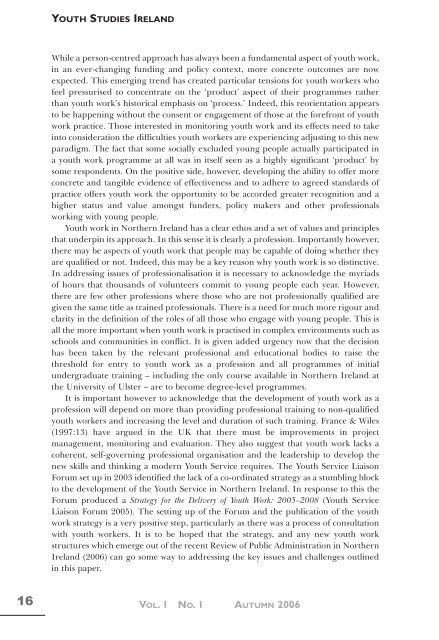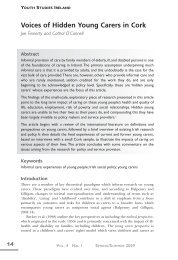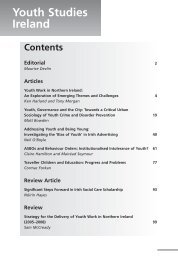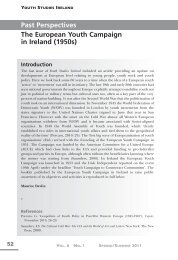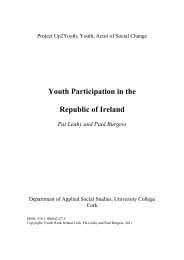Youth Work in Northern Ireland:
Youth Work in Northern Ireland:
Youth Work in Northern Ireland:
You also want an ePaper? Increase the reach of your titles
YUMPU automatically turns print PDFs into web optimized ePapers that Google loves.
YOUTH STUDIES IRELANDWhile a person-centred approach has always been a fundamental aspect of youth work,<strong>in</strong> an ever-chang<strong>in</strong>g fund<strong>in</strong>g and policy context, more concrete outcomes are nowexpected. This emerg<strong>in</strong>g trend has created particular tensions for youth workers whofeel pressurised to concentrate on the ‘product’ aspect of their programmes ratherthan youth work’s historical emphasis on ‘process.’ Indeed, this reorientation appearsto be happen<strong>in</strong>g without the consent or engagement of those at the forefront of youthwork practice. Those <strong>in</strong>terested <strong>in</strong> monitor<strong>in</strong>g youth work and its effects need to take<strong>in</strong>to consideration the difficulties youth workers are experienc<strong>in</strong>g adjust<strong>in</strong>g to this newparadigm. The fact that some socially excluded young people actually participated <strong>in</strong>a youth work programme at all was <strong>in</strong> itself seen as a highly significant ‘product’ bysome respondents. On the positive side, however, develop<strong>in</strong>g the ability to offer moreconcrete and tangible evidence of effectiveness and to adhere to agreed standards ofpractice offers youth work the opportunity to be accorded greater recognition and ahigher status and value amongst funders, policy makers and other professionalswork<strong>in</strong>g with young people.<strong>Youth</strong> work <strong>in</strong> <strong>Northern</strong> <strong>Ireland</strong> has a clear ethos and a set of values and pr<strong>in</strong>ciplesthat underp<strong>in</strong> its approach. In this sense it is clearly a profession. Importantly however,there may be aspects of youth work that people may be capable of do<strong>in</strong>g whether theyare qualified or not. Indeed, this may be a key reason why youth work is so dist<strong>in</strong>ctive.In address<strong>in</strong>g issues of professionalisation it is necessary to acknowledge the myriadsof hours that thousands of volunteers commit to young people each year. However,there are few other professions where those who are not professionally qualified aregiven the same title as tra<strong>in</strong>ed professionals. There is a need for much more rigour andclarity <strong>in</strong> the def<strong>in</strong>ition of the roles of all those who engage with young people. This isall the more important when youth work is practised <strong>in</strong> complex environments such asschools and communities <strong>in</strong> conflict. It is given added urgency now that the decisionhas been taken by the relevant professional and educational bodies to raise thethreshold for entry to youth work as a profession and all programmes of <strong>in</strong>itialundergraduate tra<strong>in</strong><strong>in</strong>g – <strong>in</strong>clud<strong>in</strong>g the only course available <strong>in</strong> <strong>Northern</strong> <strong>Ireland</strong> atthe University of Ulster – are to become degree-level programmes.It is important however to acknowledge that the development of youth work as aprofession will depend on more than provid<strong>in</strong>g professional tra<strong>in</strong><strong>in</strong>g to non-qualifiedyouth workers and <strong>in</strong>creas<strong>in</strong>g the level and duration of such tra<strong>in</strong><strong>in</strong>g. France & Wiles(1997:13) have argued <strong>in</strong> the UK that there must be improvements <strong>in</strong> projectmanagement, monitor<strong>in</strong>g and evaluation. They also suggest that youth work lacks acoherent, self-govern<strong>in</strong>g professional organisation and the leadership to develop thenew skills and th<strong>in</strong>k<strong>in</strong>g a modern <strong>Youth</strong> Service requires. The <strong>Youth</strong> Service LiaisonForum set up <strong>in</strong> 2003 identified the lack of a co-ord<strong>in</strong>ated strategy as a stumbl<strong>in</strong>g blockto the development of the <strong>Youth</strong> Service <strong>in</strong> <strong>Northern</strong> <strong>Ireland</strong>. In response to this theForum produced a Strategy for the Delivery of <strong>Youth</strong> <strong>Work</strong>: 2005–2008 (<strong>Youth</strong> ServiceLiaison Forum 2005). The sett<strong>in</strong>g up of the Forum and the publication of the youthwork strategy is a very positive step, particularly as there was a process of consultationwith youth workers. It is to be hoped that the strategy, and any new youth workstructures which emerge out of the recent Review of Public Adm<strong>in</strong>istration <strong>in</strong> <strong>Northern</strong><strong>Ireland</strong> (2006) can go some way to address<strong>in</strong>g the key issues and challenges outl<strong>in</strong>ed<strong>in</strong> this paper.16 VOL. 1 NO. 1 AUTUMN 2006


